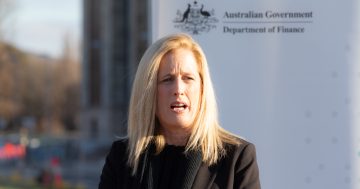
Small Business and Family Enterprise Ombudsman Bruce Billson. Photo: Supplied.
Katy Gallagher has called in the small business ombudsman to scrutinise government procurement and determine whether small business is getting enough of the action.
The Finance and Public Service Minister wants particular attention paid to reforms introduced last year that aim to increase small and medium-sized businesses’ share of lucrative Commonwealth contracts.
The Federal Government has an $80.8 billion annual procurement spend, yet small businesses do not even get a third of it.
Small Business and Family Enterprise Ombudsman Bruce Billson will advise the Minister on whether the changes introduced in July are seeing that percentage increase.
“In 2021-22, the Australian Government awarded $80.8 billion in procurement contracts, of which 30.8 per cent, or just under $25 billion by value, was awarded to small and medium-sized enterprises,” Mr Billson said.
“It’s great to see the Australian Government’s commitment to be a bigger customer for small businesses.
“But for many small and family businesses, identifying and securing Commonwealth procurement contracts can be complex, costly, confusing and time-consuming.
“Supporting the opportunity for small and family businesses to compete for and fully participate in supplying the goods and services the Australian Government needs helps to ensure full value for money, vitality in the economy, support for local businesses to scale and can enable innovation.”
The ombudsman said his office was determined to shine a light on government departments whose track record with small business was not good enough.
“Where there are procurement impediments, it can diminish opportunities to encourage entrepreneurship and competition and means the taxpayer and the nation may not be getting the most value for money,” he said.
“It is timely to examine how the system is working for small and family businesses, the role procurement rules are playing to support small business participation and what lessons and improvements can be made.
“We want to identify those departments and agencies who are exemplars in providing procurement opportunities to small businesses and celebrate this success and help others to emulate it.
“Similarly, we seek to shine a light on those whose dealings with small business are poor.”
Mr Billson said his review would seek to identify additional changes to Commonwealth procurement rules and processes to boost small business participation.
The review will also examine the effectiveness of AusTender, the Commonwealth Contracting Suite, methods for identifying small businesses, and other measures to enable small businesses to join together to bid for larger and multi-faceted contracts, and how accessible rolling short-listed provider ‘panels’ are for smaller businesses.
The ombudsman said a concern frequently raised by small businesses was how to know about and tender for government contracts.
“We want to look at what support is given to small businesses to navigate what can be a complicated procurement process,” he said.
“In some cases, small businesses are deterred by a feeling there is a ‘closed shop’ while in other cases they simply don’t know about the opportunities available, or the size of the contract can be simply too big.”
Close attention will be paid to whether capacity-building contracts were being offered that would enable smaller businesses to benefit from the contracts to grow their business.
Bundled procurement contracts or large work packages that make it difficult for small businesses to compete for tenders will also be reviewed.
Small business access to procurement panels and what is termed ‘piggybacking’ arrangements between agencies are now under the spotlight.
(According to the Department of Finance, ‘piggybacking’ is where one entity has established a panel and has made the panel or standing offer arrangement available to other entities.)
The small business ombudsman is now releasing an issues paper, inviting written submissions from small businesses and other interested parties.
Submissions should be sent to inquiries@asbfeo.gov.au by 1 July this year
A final report with recommendations will be handed to the Minister in December.
The review’s full terms of reference can be found on the ombudsman’s website.





















